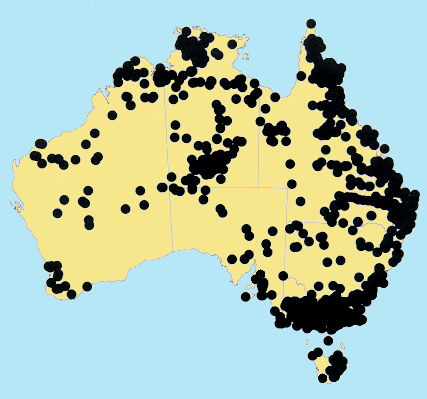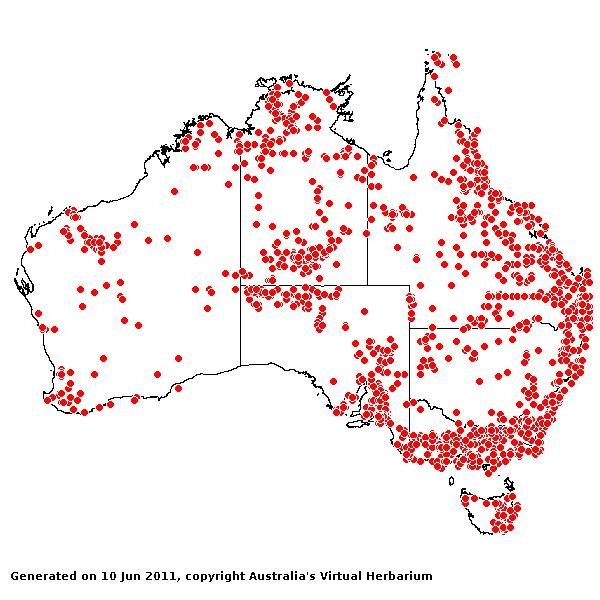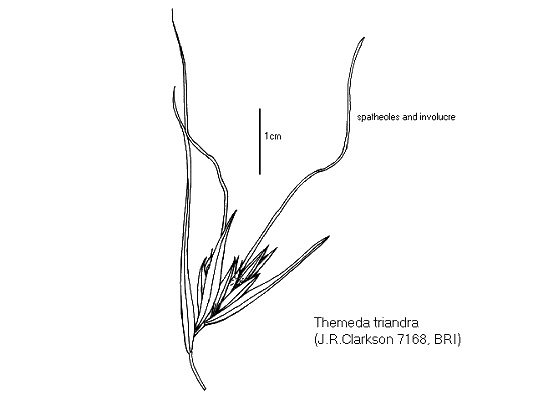Themeda triandra Forsk. Fl.
Aegypt.-Arab. 178 (1775).
Classification. (GPWG 2001) : Subfamily
Panicoideae. Andropogoneae.
Type of Basionym or
Protologue Information: Yemen: Al Hadiyah, 1763, Forsskål s.n. (HT:
C (destroyed)).
Recent synonyms:
T. australis.
Key references
(books and floras): [1810]. R.Brown, Prodromus (200 as Anthistiria
australis), [1878] G.Bentham, Flora Australiensis 7 (542 as Anthistiria
ciliata), [1952] C.A.Gardner, Flora of Western Australia 1 Gramineae
(344 as T. australis), [1981] M.Lazarides in J.Jessop (ed)., Flora of
Central Australia (493 as T. australis), [2002] D.Sharp &
B.K.Simon, AusGrass, Grasses of Australia, [2002] J.Wheeler, N.Marchant
& M.Lewington, Flora of the South West (437), [2006] J.Jessop,
G.R.M.Dashorst, F.M.James, Grasses of South Australia (534), [2008]
S.W.L.Jacobs, R.D.B.Walley & D.J.B.Wheeler, Grasses of New South Wales
(282 as T. australis).
Illustrations:
[1952] C.A.Gardner, Flora of Western Australia 1 Gramineae (343,
Pl.100 as T. triandra), [2006] J.Jessop, G.R.M.Dashorst, F.M.James, Grasses
of South Australia (535, fig. 456),
[1984] N.T.Burbidge. rev. S.W.L.Jacobs, Australian Grasses (255 as T. australis), [2008]
S.W.L.Jacobs, R.D.B.Whalley & D.J.B.Wheeler, Grasses of New South Wales,
4th edn (387 as T. australis).
Habit.
Perennial. Basal leaf sheaths present. Culms erect, 30–200 cm tall. Ligule a
fringed membrane, a ciliolate membrane. Leaf-blades flat, 10–30 cm long, 1–8 mm
wide.
Inflorescence.
Inflorescence compound, of pedicelled spikelet clusters. Rhachis fragile at the
nodes.
Spikelets.
Spikelets sessile, 1 in the cluster. Companion spikelets pedicelled, 2 in the
cluster. Basal sterile spikelets well-developed, 4 in number. Companion
spikelets developed, male, 6–14 mm long. Fertile spikelets 2-flowered, the
lower floret barren (rarely male), the upper fertile, comprising 1 basal
sterile florets, comprising 1 fertile floret(s), without rachilla extension,
elliptic, terete, 6–11 mm long.
Glumes. Glumes
dissimilar, firmer than fertile lemma, shiny. Lower glume oblong, coriaceous,
without keels, 7–9 -nerved. Lower glume surface indumented. Upper glume oblong,
3 -nerved. Florets. Basal sterile florets 1, barren, without significant
palea. Lemma of lower sterile floret hyaline, 0 -nerved.
Fertile lemma without
keel, 1 -nerved. Lemma apex entire, awned, 1 -awned. Median (principal) awn
apical, 25–70 mm long overall, with a twisted column. Palea absent.
Continental
Distribution: Africa, Temperate Asia, Tropical Asia, Australasia, and
Pacific.
Australian
Distribution: Western Australia, Northern Territory, South Australia,
Queensland, New South Wales, Victoria, Tasmania.
Western Australia:
Gardner, Fitzgerald, Hall, Dampier. Northern Territory: Darwin &
Gulf, Victoria River, Barkly Tableland, Central Australia North, Central
Australia South. South Australia: North-western, Lake Eyre,
Gairdner-Torrens Basin, Flinders Ranges, Eastern, Eyre Peninsula, Northern
Lofty, Murray, Yorke Peninsula, Southern Lofty, South-eastern. Queensland:
Burke, Burnett, Cook, Darling Downs, Gregory North, Leichhardt, Maranoa,
Mitchell, Moreton, North Kennedy, Port Curtis, South Kennedy, Warrego, Wide
Bay, Gregory South. New South Wales: North Coast, Central Coast, South
Coast, Northern Tablelands, Central Tablelands, Southern Tablelands,
North-Western Slopes, Central-Western Slopes, South-Western Slopes,
North-Western Plains, South-Western Plains, North Far Western Plains. Victoria:
East Gippsland, Eastern Highlands, Gippsland Highlands, Gippsland Plain,
Grampians, Lowan Mallee, Midlands, Otway Plain, Otway Range, Wilsons
Promontory, Riverina, Snowfields, Volcanic Plain, Wannon, Wimmera. Tasmania:
North West, North East, Ben Lomond, East Coast, South West.
Notes. A very
widespread species, "perhaps the most widespread grass in Australia",
fide J.C.Tothill & J.B.Hacker 1983, but it recently has become
scarce as a result of overgrazing. Extends throughout the subtropics and
tropics of the Old World. Flowers all year.








